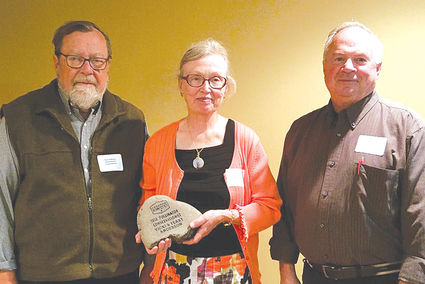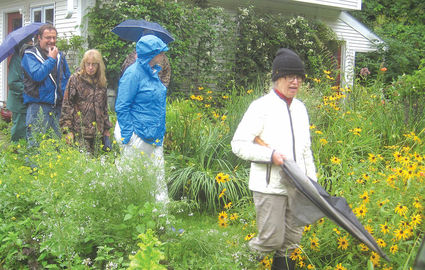Passion for pollinators
Couple creates pollinator habitat, one step, one spot at a time
January 18, 2019

Terry and Vicki Anderson (on left and center) with their "garden stone" award presented by Jim Nynas, SWCD supervisor.
"My mission in life is not merely to survive, but to thrive; and to do so with some passion, some compassion, some humor, and some style." ~ Maya Angelou
For many of us, life sometimes becomes mere survival. We feel that each day is like the one before ... going to work to make the money to pay the bills that enable us to live and be able to go to work to make the money to pay the bills. Over and over, ad infinitum.
However, there are also many people who have found their passion, something that makes each day a wonderful day to wake up and go to work. And for some of these people, compassion has led to their passion. This is the case with Cloquet's Dr. Vicki and Terry Anderson, winners of the 2018 Outstanding Pollinator Habitat award given by the Carlton County Soil and Water Conservation District (SWCD).
In the Andersons' case, their passion came from compassion for some of the world's smallest animals - in their case, pollinators, such as wild and tame bees, beetles, butterflies, moths, flies, birds. Pollinators are the animals that carry pollen from the male to the female parts of flowering plants. They are essential in natural and agricultural ecosystems. Without pollinators, most vegetable, fruit, flower, grass, and seed plants would not be able to live and produce products we depend on, such as food, herbs, medicines, etc. Without pollinators, we would all have a literal fight for survival.
Through the last few decades, the numbers of pollinators have decreased quite a bit, according to scientists who have been monitoring the situation around the world. In fact, some recent studies show that beekeepers in the U.S. have lost 30-42 percent of their bee colonies every year since 2006. Those numbers are astounding and deeply disturbing!
The biggest causes of the decrease in pollinators are exposure to parasites and pesticides and loss of abundance and diversity of habitat. While we may not individually be able to stop the parasites and pesticides, we can each surely plant gardens to increase pollinator habitat.
And that is just what the Andersons have been doing. With compassion and passion, they have set out to increase pollinator habitat everywhere and anywhere they can, and they have also sought to reach out to teach, encourage, and help others to plant pollinator gardens, too.
The Andersons' passion was stirred when they purchased their Cloquet home in 1976; the property was overrun with buckthorn, sumac, box elder, and trash. Through the years, they cleaned up the property, pulled out the invasive species, and turned that property into a "diverse, healthy native plant habitat for pollinators," said Kelly Smith, Carlton SWCD forestry technician.
Then they turned to developing pollinator habitat on the grounds of their church, Zion Lutheran Church in Cloquet. They started in 1994 by planting 28 apple trees of several varieties. These have been maintained, providing excellent habitat for pollinators. In 2012, the Andersons started working with the fifth-grade Sunday School class to develop and plant a 2,500-square-foot wildflower garden adjacent to the orchard area. They tried to balance native plants with non-natives plants, as a "wide variety of plants support a wide variety of pollinators," said Smith, who added that a diverse mix of plants is more resilient to drought, disease and other problems.
The garden - with its 33 species of flowers and grasses - has thrived and started to flourish, thanks mostly to the work the Andersons have put in with help from adults and children of the church and community. They manually weed the gardens, control invasive species, and collect seeds for replanting, passing them on to others to plant.
In 2017, the Andersons spread their teaching even further. They teamed up with the Carlton SWCD and the Kettle River Woodland Council to share their passion for pollinators by hosting a tour of the gardens at the church and their home. Along with Smith, the Andersons presented information about establishing a native plant habitat for pollinators, including information about available planning and funding assistance.
The Andersons show others that each season bring something to anticipate, something to fuel their passion.
Smith talked in poetic terms about the gardens the Andersons have created.
"They are blessed with a plethora of bees throughout the growing season. Shrubs like cotoneaster vibrate with activity when they blossom in early spring," he said.
He rattled off plants and their seasons.
Shrub roses, dogwoods, blueberries, azaleas, rhododendrons, thimbleberry, nannyberry, gooseberry, serviceberry and elderberry provide early spring food for pollinators.
Later, bee balm, coneflowers, milk weeds, echinacea, joy pye weed, heliopsis, rudbeckia, golden alexanders, penstemon, roses, hydrangea, lupine, false indigo and many others attract beneficial insects, bees and neighborhood children.
"Woody pollinator plants include viburnum, forsythia, lilac, chokecherry, willow, burning bush and maple," Smith added. "Their shrub roses have rose hips that are enjoyed by birds all winter. They don't clean up their gardens until spring as who knows what goes on amongst the dry garden plants in winter."
Along the way and through the years, the Andersons have taught children and adults about gardening, wildflowers, and pollinators .... as well as life, compassion, and passion. This is why SWCD thanks Vicki and Terry Anderson for their many years of work on behalf of pollinators and why we bestowed upon them the 2018 Outstanding Pollinator Habitat award. May each of us catch their passion and work to help pollinators in our own little corners of the world, too!
Kim Samuelson is Carlton SWCD's elected supervisor for District 4. For more information about pollinators, establishing a pollinator habitat, and the annual Conservation Awards program, contact Carlton SWCD at 218-384-3891. You can also find more information about Carlton SWCD on Facebook or on their website at http://www.carltonswcd.org.


